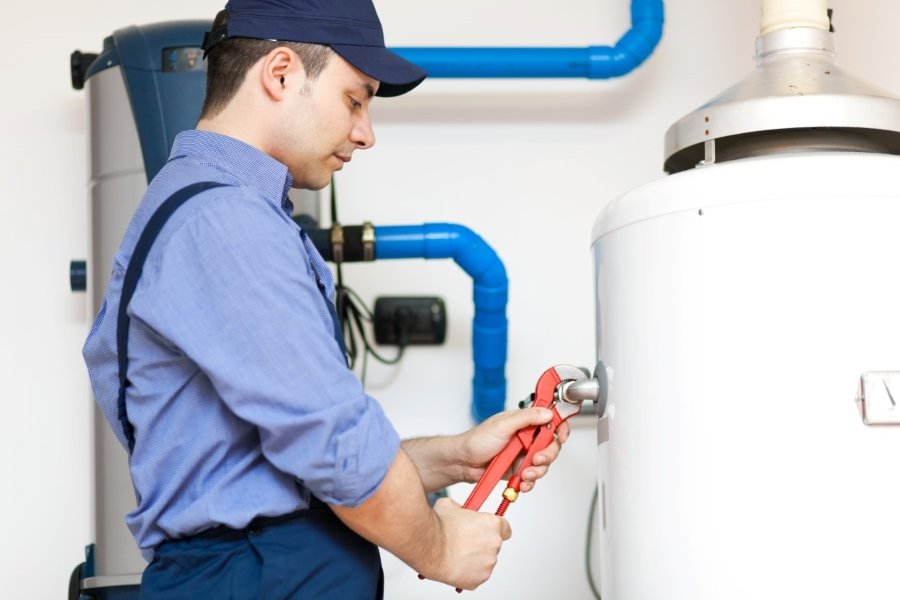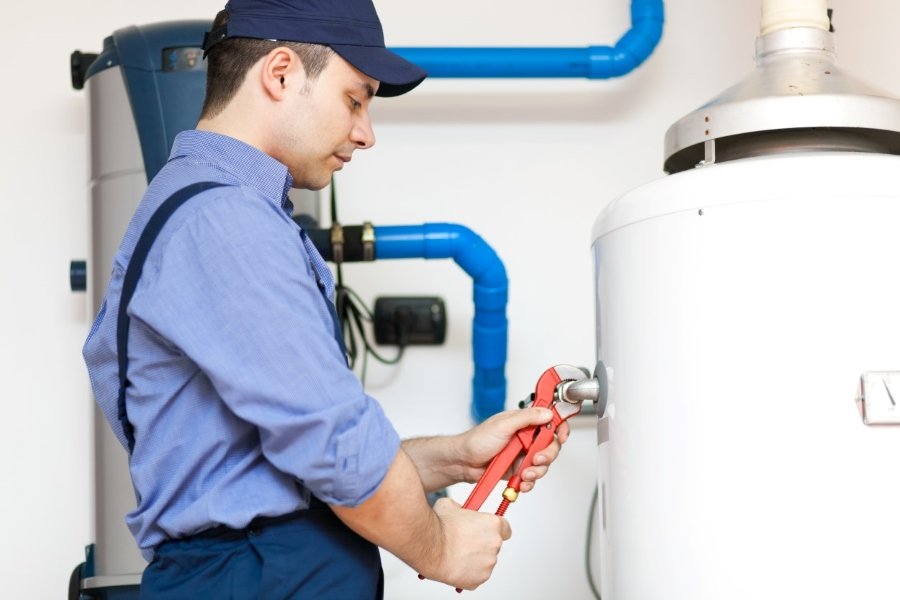Replacement Water Heater – Austin,TX
CALL FOR AN ESTIMATE
What is the average labor cost to install a 50 gallon gas water heater?
Keep in mind that this cost may include tasks such as removing the old water heater, installing the new one, connecting gas and water lines, and testing the unit for proper operation. Additional factors that can affect the labor cost include any necessary upgrades or modifications to the plumbing or gas lines and the accessibility of the installation site.
It’s always a good idea to obtain quotes from multiple plumbers in your area to get a better understanding of the average labor cost for your specific installation requirements. Additionally, be sure to ask about any additional fees or charges that may apply to your project.



Plumber Near Me….
Request A Quote
We promise to get back to you as soon as possible.
What plumbing services do you offer?
DRAIN CLEANING SERVICES
WATER HEATER REPAIR /REPLACEMENT
TOILET REPLACEMENT
PLUMBING SERVICES
KITCHEN SINK REPLACEMENT
GARBAGE DISPOSAL REPAIR
RESIDENTIAL PLUMBING SERVICES
COMMERCIAL PLUMBING SERVICES
GARBAGE DISPOSAL REPLACEMENT
Schedule An Estimate
CALL NOW (512) 894-6169
Should I replace my 20 year old water heater?
Deciding whether to replace a 20-year-old water heater depends on several factors:
1. Efficiency: Older water heaters may not be as energy-efficient as newer models. If your water heater is nearing the end of its lifespan, replacing it with a more energy-efficient model could lead to cost savings on your utility bills over time.
2. Reliability: As water heaters age, they become more prone to leaks, corrosion, and other issues that can lead to failures and water damage. If your water heater has been experiencing frequent problems or is showing signs of deterioration, it may be wise to replace it before a major failure occurs.
3. Repair costs: Consider the cost of repairs versus the cost of replacement. If your water heater requires frequent repairs or if the cost of repairing a major issue is significant, it may be more cost-effective to invest in a new unit.
4. Safety concerns: Older water heaters may pose safety risks if they are not functioning properly. For example, a malfunctioning gas water heater could present a carbon monoxide hazard. If you have concerns about the safety of your water heater, it may be time to replace it.
5. Warranty coverage: Most water heaters come with a warranty that covers certain parts or repairs for a specific period. If your water heater is still under warranty, replacing it before the warranty expires could save you money on future repairs.
6. Changing needs: If your household has grown or your hot water usage patterns have changed since your current water heater was installed, you may need change water heater for or more efficient unit to meet your needs.
Ultimately, the decision to replace your water heater depends on your individual circumstances, including the age and condition of your current unit, your budget, and your long-term goals for energy efficiency and reliability. If you’re unsure whether it’s time to replace your water heater, consider consulting with a professional plumber for an assessment and recommendation based on your specific situation.
How do you know when a hot water heater needs to be replaced?
Several signs indicate that a hot water heater may need to be replaced:
1. Age: The age of the water heater is a significant factor in determining whether it needs replacement. Most traditional tank water heaters have a lifespan of around 10 to 15 years. If your water heater is approaching or exceeding this age range, it may be time to consider replacement, even if it’s still functioning.
2. Lack of hot water: If you’re experiencing consistently lukewarm or cold water from your taps, it could indicate a problem with the heating element or tank of the water heater. This issue may be repairable, but if it persists despite maintenance efforts, it may be a sign that the water heater needs to be replaced.
3. Rusty or discolored water: Rusty or discolored water coming from your taps could indicate corrosion inside the water heater tank. Rusty water can also be a sign of deteriorating pipes or fittings. If you notice rusty water, it’s essential to have the water heater inspected by a professional emergency plumber near me to determine the source of the issue.
4. Leaks or pooling water: Visible leaks or pooling water around the water heater are clear indicators of a problem. Even minor leaks can lead to significant water damage if left unaddressed. If you notice any signs of leakage, it’s crucial to have the water heater repair promptly and replaced if necessary.
5. Strange noises: Loud banging, popping, or rumbling noises coming from the water heater can indicate sediment buildup inside the tank. While sediment buildup can often be flushed out to improve performance, excessive noise may indicate more severe issues that require replacement.
6. Increased energy bills: A sudden or gradual increase in energy bills without a corresponding increase in usage could indicate that the water heater is losing efficiency. As water heaters age, they become less efficient, leading to higher energy costs. Replacing an older, inefficient water heater with a newer, energy-efficient model can help lower your energy bills over time.
7. Frequent repairs: If your water heater requires frequent repairs or maintenance to keep it functioning, it may be more cost-effective to replace it with a newer unit. Continuously repairing an older water heater can become costly, and eventually, the cost of repairs may outweigh the cost of replacement.
If you notice any of these signs or have concerns about the performance or safety of your water heater, it’s essential to call with a plumbing companies close to me for an inspection and recommendation tailored to your specific situation.
What is the best water heater?
1. Conventional tank water heaters: These are the most common type of water heaters, consisting of a tank that heats and stores hot water until it’s needed. Conventional tank water heaters are relatively affordable and come in various sizes to accommodate different household needs.
2. Tankless water heaters: Tankless water heaters, also known as on-demand or instantaneous water heaters, heat water directly as it flows through the unit without the need for a storage tank. Tankless water heaters are more energy-efficient than conventional tank heaters and can provide an endless supply of hot water, but they typically have a higher upfront cost.
3. Heat pump water heaters: Heat pump water heaters use electricity to move heat from the air or ground into the water tank, making them more energy-efficient than conventional electric water heaters. Heat pump water heaters are suitable for climates with moderate temperatures but may not be as efficient in colder climates.
4. Solar water heaters: Solar water heaters use solar panels to capture and convert sunlight into heat, which is then used to heat water in a storage tank. Solar water heaters can be an environmentally friendly and cost-effective option in sunny climates but may require a significant upfront investment.
5. Condensing water heaters: Condensing water heaters use a secondary heat exchanger to extract additional heat from combustion gases, making them more efficient than conventional gas water heaters. Condensing water heaters are ideal for homeowners looking to maximize energy savings and reduce emissions.
When choosing a water heater, consider factors such as your hot water usage patterns, the size and layout of your home, energy efficiency ratings, installation requirements, and budget. It’s also a good idea to consult with a professional plumber to discuss your options and determine the best water heater for your specific needs.
About the City of Austin, TX
Apple Plumber and Water Heater Repair
5000 W Slaughter Ln, Austin, TX 78749
(737) 977-9963
Hours of Operation
Mon Open 24 hours
Tue Open 24 hours
Wed Open 24 hours
Thu Open 24 hours
Fri Open 24 hours
Sat Open 24 hours
Sun Open 24 hours
